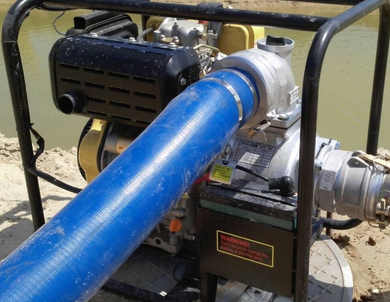Parameter selection of agricultural irrigation pump
The parameter selection of agricultural irrigation pumps is a key link to ensure the efficient operation of the irrigation system and the good growth of crops. The following are some of the main parameter selection points:
1. Lift
Lift refers to the height that the water pump lifts from the lower place to the higher place. In agricultural irrigation, the choice of lift is crucial.
General selection: The lift of farmland irrigation pumps is generally selected within 30 meters, which is determined based on the irrigation needs and terrain conditions of most farmlands.
Special selection: In special circumstances, such as when the terrain is undulating or when long-distance water transportation is required, a pump with a lift of more than 100 meters can be selected.
2. Flow rate
The flow rate refers to the amount of water that the pump can deliver per second, usually in cubic meters per hour (m³/h) or liters per second (l/s).
Flow range: The flow rate of large agricultural irrigation pumps is generally between 20-5000m³/h. The specific selection should be based on the size of the irrigation plot, the irrigation method and the required water volume.
Selection for small farms: For small farms or plots with small irrigation areas, you can choose a water pump with a smaller flow rate, such as a water pump with 1~5L/s per hour.
3. Power
Power refers to the power capacity required by the water pump, and is also an important factor affecting the flow and head of the water pump.
Power range: In agricultural irrigation, large water pumps with 10-200 horsepower are usually selected. The specific power selection should be determined according to the actual needs of the irrigation system and the power supply.
Energy saving considerations: When choosing a water pump, high-efficiency and energy-saving models should be given priority to reduce operating costs and energy consumption.

4. Types of pumps
Different types of water pumps can be selected according to the actual conditions of the farmland and irrigation needs.
Centrifugal pumps: Suitable for large flow, medium to high pressure agricultural irrigation needs, and can be used to transport water to fields or irrigation systems over long distances.
Submersible pumps: Located in the water source, it lifts water to the place where irrigation is needed through its own hydraulic power. It is suitable for irrigation in areas with complex geographical conditions or large terrain undulations, and is also suitable for irrigation in water sources such as well water, rivers or lakes.
Self-priming pump: Self-priming pump is a good choice for applications where the head is greater than 10 meters and self-priming capability is required.
Pressure booster pump: used in sprinkler irrigation systems, it can increase water pressure to meet the requirements of high pressure and uniform water flow.
Mobile diesel pump or solar pump: For small farms or situations where mobile irrigation is required, these two pumps are portable and flexible. Solar pumps use solar energy to drive, without external power supply, and are suitable for farmland in remote areas or without power supply.
5. Other considerations
Water quality: Determine whether to choose a clean water pump or a sewage pump based on whether the water contains sediment. Clean water pumps are suitable for water sources with clearer water quality, while sewage pumps are suitable for water sources with a certain amount of sediment or impurities.
Maintenance convenience: When choosing a water pump, you should also consider whether it is easy to repair. Some water pumps that are easy to repair and replace parts will reduce the cost and time of later maintenance.




